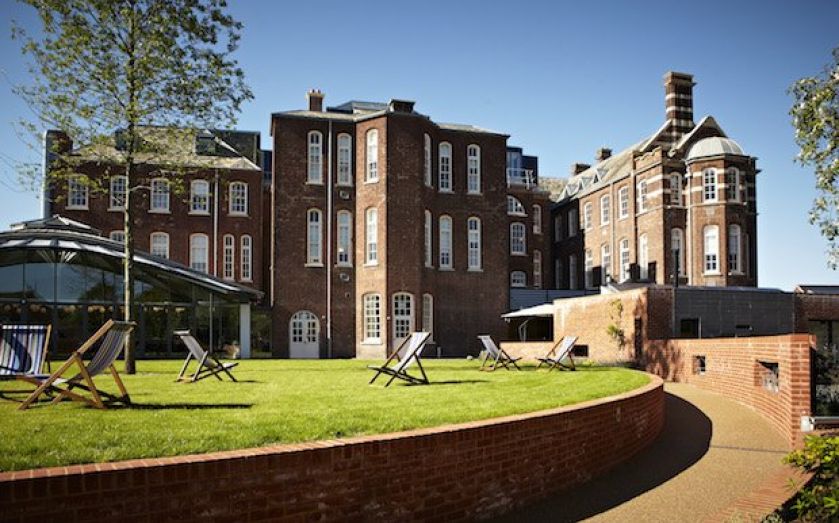Why Devon is the capital of grape Britain

The English wine industry is thriving. Kasmira Jefford marks Wine Week with a trip to see where it’s made
WHEN driving south from Exeter towards the coastal town of Teignmouth, the road makes a steep ascent over the Haldon Hills where, according to local legend, the first vineyards in Britain were planted by the Romans.
Now, 1950 years after the Romans first introduced England – and Devon – to this much loved tipple, the country’s wine business is thriving again, and growing fast.
Over the last 15 years, the number of people trying their hand at making wine in Britain’s tricky weather conditions has boomed, and there are now 400 vineyards in England and Wales covering some 3,500 acres. The English wine industry is winning over investors and hedge funds that have clocked that the country can produce decent wine and a sparkling wine not far off the quality of those produced in Champagne.
East Devon’s warm and sunny climate, its plentiful south facing slopes and the proximity to the sea make it an ideal place to grow grapes. I travelled down earlier this month to take part in a guided tour organised by ex-BBC publishing director Andy Benham and his wife Kate, who set up their business South Devon Wine Tours this year to tap into the industry’s growing success.
Five Devon vineyards have signed up to be a part of the Benham’s tours, which officially launched this week to coincide with English Wine Week. Our first stop, after crossing over the famous Haldon hills, is the picturesque village of Bishopsteignton, home to Ken Dawe’s Old Walls vineyard, which takes its name from the nearby ruins of an old 13th century bishop’s palace.
Like other winemakers I meet on the tour, Dawe’s career in wine began by chance some 15 years ago when a family feud forced him to turn his back on farming. His family had farmed land for over 100 years but after a spat, he decided to walk away, inheriting his six-acre share of the land. After seeking advice from friends, Dawe decided to set up a wine business and now has over eight acres and 10,000 vines, producing grapes well-suited to England’s chillier climate such as Rondo, Regent and Bacchus.
Shouting over the wind that hurtles its way over the neat rows of vines, Dawe takes me through every gritty aspect of setting up a vineyard, from buying the vines, which are imported from Germany at £2 each, to planting, pruning, picking and finally the winemaking.
At the next vineyard in Clyst St George, Geoff Bowen is quick to dash any romanticism about the art of winemaking. A former geologist who toured the world working on major skyscraper projects, Bowen’s Pebblebed Vineyards was thought up over a drink with friends at a local Devon pub. One of his mates had bought a house with extra land and together they decided to launch a community project initially involving nine other families.
In 2010, after pitching his vine-share scheme on Dragons Den, Bowen sealed financial backing from Duncan Bannatyne and over 30 other business partners, who invested in return for 10 years involvement in the project. Pebblebed, now the largest vineyard in Devon with 23 acres of land and produced an impressive 50,000 bottles of wine last year. But making profit from wine is no easy feat and after two terrible harvests in 2011 2012, Bowen and winemakers have come to rely on other sources of incomes like running restaurants, wine tours and tastings.
Bowen says he has no interest in selling his wines nationally: “Our aim is not to produce wines you drink in Harvey Nichols. We want to be like those local vineyards you find in Tuscany where friends gather and people travel to try the wine.”
In the barn of his farmhouse that houses Pebbledbed’s huge wine tanks, Bowen uncorks a bottle of sparkling rosé and explains how, unusually, his sparkling wine is fermented in the bottle for an extra two years.
It is stored upside-down and twisted vigorously so that the sediment gathers in the neck of the bottle. Then, to take out the sediment without losing the fizz, the neck of the bottle is frozen, the cork is taken off and the frozen liquid comes shooting out like a bullet before the bottle is topped up again with more wine. That, in essence, is how you make a sparkling wine.
After speeding in Benham’s van to a third vineyard called Lily Farm, I finished my day with a stay at Magdalen Chapter in Exeter. But not before tasting all the wines again over dinner, of course.
VINEYARDS TO VISIT IN DEVON & CORNWALL
1 Old Walls Vineyard
2 Pebblebed Vineyards
3 Lily Farm
4 Sharpham
5 Yearlston
6 Camel Valley
7 Eastcott Vineyard
8 Manstree Vineyard
9 Fronginwell Vineyard
10 Knightor Winery
Where to Stay
The Magdalen Chapter hotel has launched its English Wine package this week to coincide with Wine week. Prices from £449 and include two nights B&B, £40 to spend on dinner on one evening at The Magdalen Chapter plus a full day's vineyard experience with South Devon Wine Tours.